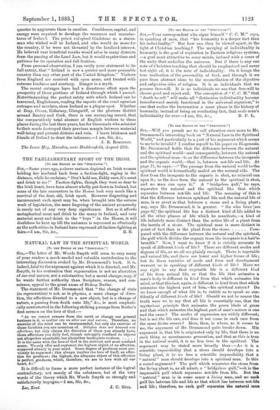NATURAL LAW IN THE SPIRITUAL WORLD. [To THE EDITOR OF
THZ " SPECTATOR:] &a,—The letter of Mr. Woods Smyth will seem to very many -of your readers a much-needed and valuable contribution to the interesting discussion evoked by Mr. Drummond's book. It is,
indeed, fatal to the argument against which it is directed, and Mr. Smyth, in his contention that regeneration is not an alteration of our real nature, not a substantive, but a moral change, may, if lie wants farther authority than Scripture, reason, and con- -science, appeal to the great name of Bishop Butler.
. The statement of Mr. Drummond that "the change of state (in regeneration) is not, as in physics, a mere change of direc- tion, the affections directed to a new object, but is a change of nature, a passing from death unto life," &c., is most emphati- -daily controverted in the following striking passage from Butler's first sermon on the love of God :—
"As we cannot remove from the earth or change our general business in it, so neither can we alter our real nature. Therefore, no exercise of the mind can be recommended, but only the exercise of those faculties you are conscious of. Religion does not demand new affections, but only claims the direction of those you already have, those affections you daily feel, though unhappily confined to objects not altogether unsuitable, but altogether inadequate to them It is the same with the love of God in the strictest and most confined sense. We only offer and represent the highest object of an affection, supposed already in your mind. Some degree of goodness must pre- viously be supposed ; this always implies the love of itself, an affec- tion for goodness ; the highest, the adequate object of this affection is perfect goodness, which, therefore, we are to love with all oar heart, &c."
It is difficult to frame a more perfect instance of the logical
contradictory, not merely of the substance, but of the very words of the theory which Mr. Woods Smyth so strongly and
satisfactorily impugns.—I am, Sir, &c.,


































 Previous page
Previous page